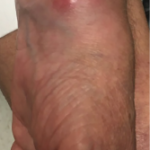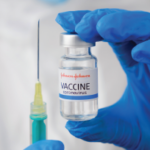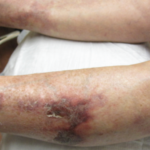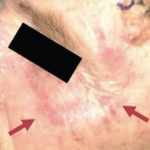Fear of injection decreased when patients with RA switched from self-administering a treatment biosimilar to etanercept in a prefilled syringe to an injector pen, according to a small observational study.


Fear of injection decreased when patients with RA switched from self-administering a treatment biosimilar to etanercept in a prefilled syringe to an injector pen, according to a small observational study.

As the U.S. and other patents for branded denosumab products get closer to expiring, drug manufacturers are initiating clinical trials for more affordable, biosimilar versions of the treatment.

In 1888, Dr. Jan Mikulicz-Radecki reported a case of chronic, bilateral, painless enlargement of the salivary and lacrimal glands that appeared to be idiopathic.1 In subsequent years, other patients with these findings were reported, and the term Mikulicz syndrome was used to describe these cases. Although Mikulicz syndrome is now known to be associated with…

Kayleigh A. Sullivan, MD, MA, MPH, Nicole Orzechowski, DO, & Elizabeth A. Talbot, MD |
A 61-year-old white woman presented to our rheumatology clinic in New England to establish care in early June 2018, following a move from Texas. She reported a medical history of inflammatory bowel disease, uveitis and seronegative inflammatory arthritis, which was difficult to control and required the use of multiple medications. At her initial visit, she…

Some artists paint with oils or watercolors, others with acrylics. Shivani Garg, MD, MS, prefers Nescafé or Maxwell House coffee. A faculty member in the Division of Rheumatology in the Department of Medicine at the University of Wisconsin School of Medicine and Public Health (UWSMPH), Madison, Dr. Garg learned this technique—painting with instant coffee mixed…

Vania Lin, MD, MPH, Robert Odrobina, MD, Maria A. Pletneva, MD, PhD, & Dorota Lebiedz-Odrobina, MD, RhMSUS |
Common variable immunodeficiency (CVID) is a common primary immunodeficiency disease, with an estimated incidence of one per 25,000–50,000 individuals.1 The classic presentation includes frequent bacterial infections, secondary to dysfunctional B cell differentiation, impaired immunoglobulin production and diminished antibody response. The clinical presentation may be heterogenous and may include granulomatous disease as an uncommon manifestation. Granulomatous…

Manuel F. Ugarte-Gil, MD, MSc, & Graciela S. Alarcón, MD, MPH |
A 26-year-old Peruvian woman presented to the emergency department of a large teaching hospital in Lima, Peru, with epistaxis and hematomas that had occurred over the preceding few days; she was found to have severe thrombocytopenia and a normocytic, normochromic anemia. She was treated with pulse doses of methylprednisolone; however, within two days, she presented…

Mary Choy, PharmD, BCGP, FASHP |
More than 7 million doses of the Johnson & Johnson single-dose vaccine have been administered in the U.S.1 On Apr. 23, the Centers for Disease Control & Prevention (CDC) and the U.S. Food & Drug Administration (FDA) recommended lifting the recommended pause on Johnson & Johnson COVID-19 vaccine use following a thorough safety review. 2…

Marie Dardeno, DO, Joshua D. Sparling, MD, & William Monaco, MD |
Calciphylaxis, or calcific uremic arteriolopathy, is a rare disease characterized by calcification of the arterioles and capillaries in the dermis and subcutaneous tissue, resulting in thrombus formation and subsequent skin ischemia and necrosis.1 This serious condition most commonly occurs in patients with end-stage renal disease (ESRD) requiring dialysis or in kidney transplant recipients. In rare…

Akrithi Udupa, MD, Paul McIntosh, MD, Thomas J. Cummings, MD, & Lisa Criscione-Schreiber, MD, Med |
Dermatomyositis is an uncommon autoimmune condition involving skeletal muscle characterized by subacute onset of progressive weakness, intramuscular inflammatory infiltrates and the presence of myositis-specific autoantibodies.1 Immune-mediated myopathies may exert some pathogenic effects on the muscle tissue by targeting the microvasculature.1 Capillary inflammation, fragility and loss may contribute to heightened bleeding events in these patients. Here,…